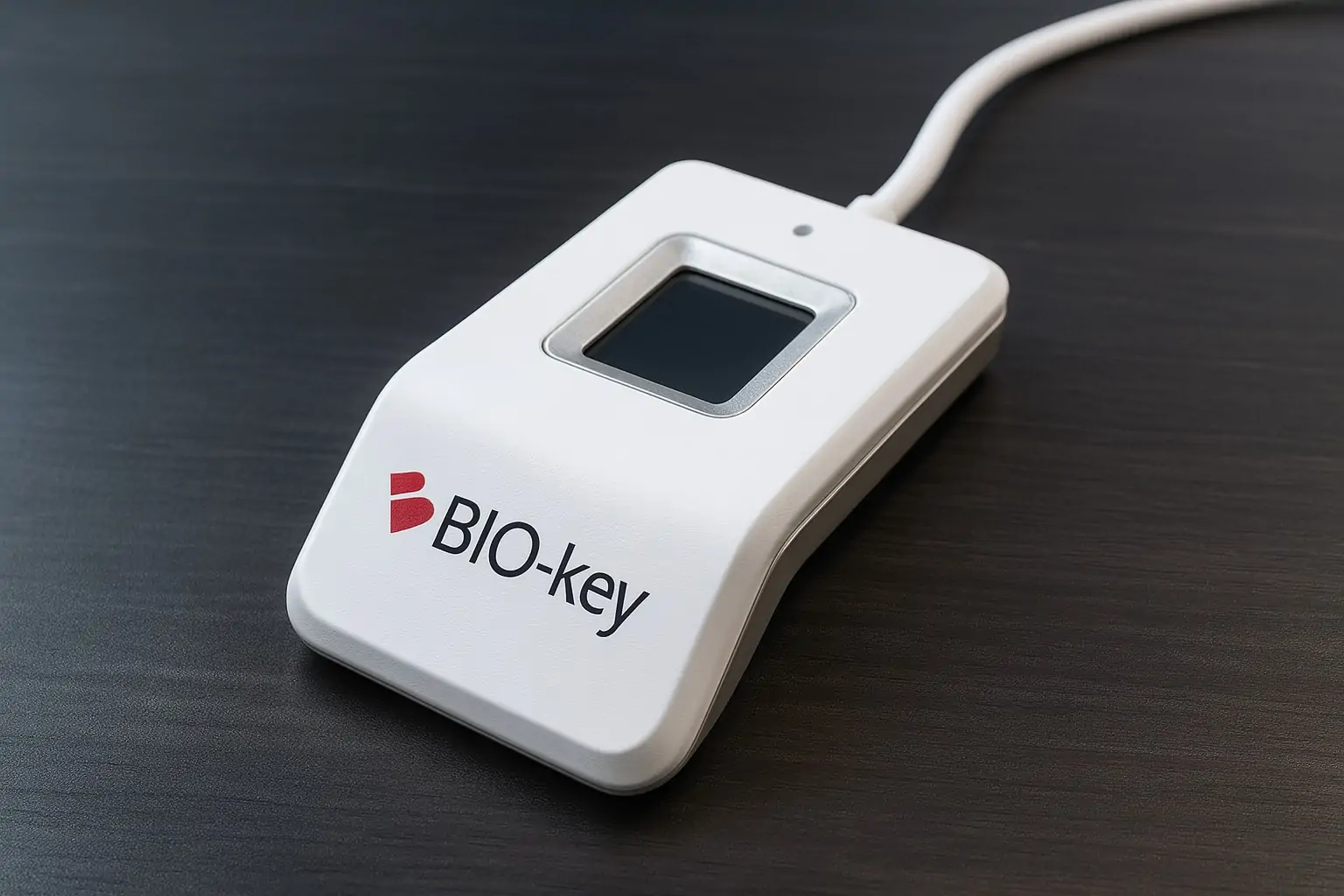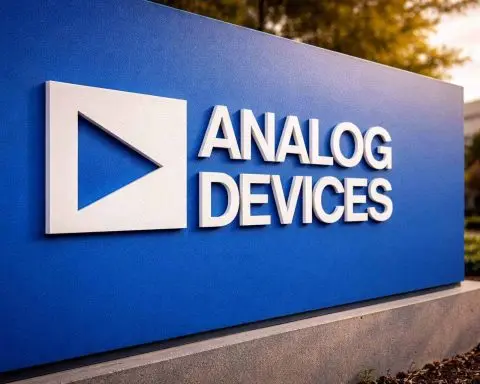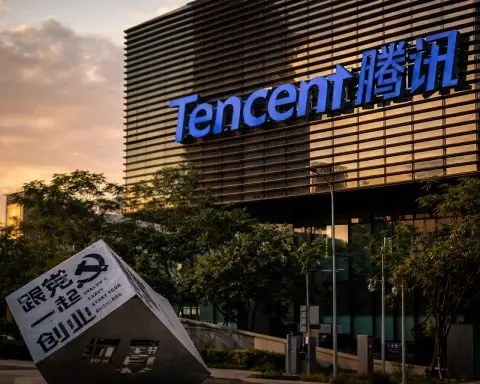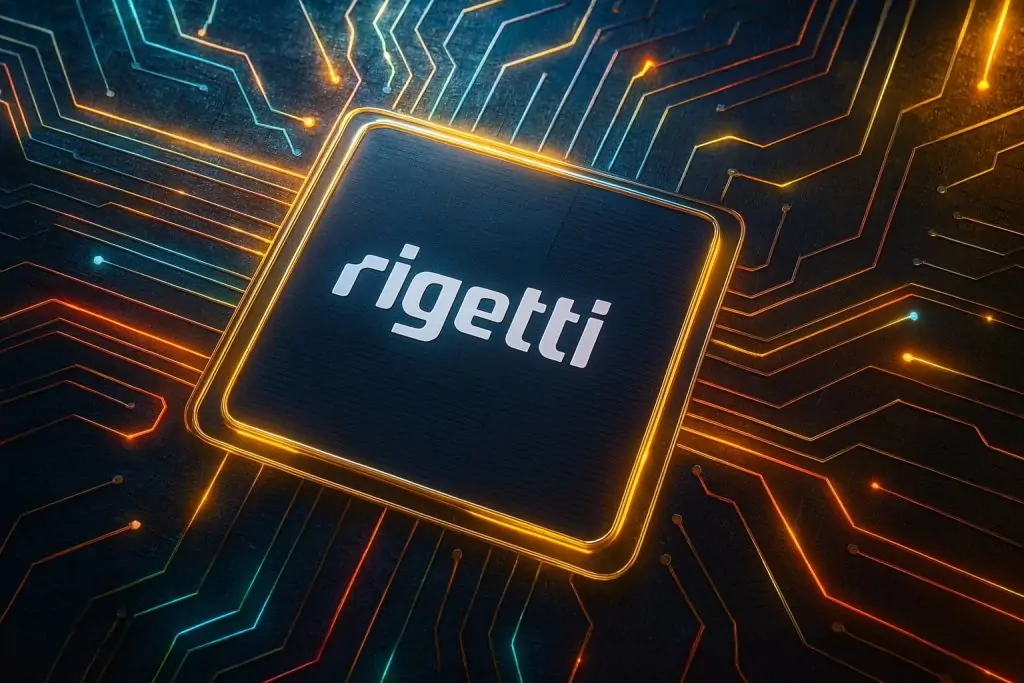- Stock Surge: BIO-key International (NASDAQ: BKYI) shares trade around $0.77 after climbing roughly 8% in the past two weeks stockinvest.us. The stock spiked to an intraday high of $0.82 last week following new product news trading212.com, though it remains down ~48% year-to-date tipranks.com.
- Nordic Expansion: The company inked a partnership with IT2Trust (a leading Scandinavian IT security distributor) on Oct. 27 to expand its Identity and Access Management (IAM) and biometric security solutions across Denmark, Sweden, Norway, and Finland globenewswire.com globenewswire.com. Executives say this “opens doors across the Nordics” by pairing BIO-key’s tech with IT2Trust’s regional reach globenewswire.com.
- New Biometric Tech: Days earlier, BIO-key launched its EcoID III USB fingerprint scanner, featuring FBI FAP 20 certification, liveness detection, and end-to-end encryption globenewswire.com globenewswire.com. The high-quality yet affordable scanner enables passwordless login via Windows Hello and is already shipping in volume to government customers, according to BIO-key globenewswire.com.
- Financials: In Q2 2025, BIO-key’s revenue surged 49% year-over-year to $1.70 million globenewswire.com, and its net loss narrowed to about $1.2 million from $1.7 M a year ago fool.com. Gross margins remain high (~73%), and operating costs have been trimmed, but the firm continues to operate at a loss globenewswire.com globenewswire.com.
- Cash & Funding: To bolster liquidity, BIO-key secured a $1.13 million senior note financing on Sept. 30 tipranks.com, yielding $1.0 M in cash for working capital. The 18-month note carries 9% interest tipranks.com. As of Q2, the company reported ~$3.1 M cash on hand waiker.ai. Insiders have shown confidence: the CEO bought 14,000 shares in June (around $11K worth) even as the stock was 60% below its 2024 level waiker.ai waiker.ai.
- Analyst Outlook: The micro-cap remains high-risk but potentially high-reward. One Wall Street analyst recently issued a “Buy” rating with a $2.00 price target, implying ~160% upside from current levels tipranks.com. However, AI-driven analysis flags “ongoing losses and cash flow issues” and weak momentum for BKYI tipranks.com. Market observers note that the stock’s tiny market cap (~$5 M) and persistent losses temper bullish expectations waiker.ai.
- Industry Context: Rising cyber threats and a global shift to passwordless security are boosting demand for biometric IAM solutions. Analysts project the global biometrics market will double to ~$100 B by 2030 (15%+ CAGR) mordorintelligence.com, while the IAM sector is on track to exceed $30 B by 2025 amid remote-work and compliance needs globenewswire.com globenewswire.com. This trend favors BIO-key’s niche, but the IAM space is dominated by tech giants like Microsoft, Okta, IBM, and Oracle globenewswire.com, posing stiff competition for market share.
Stock Price Rally Amid Recent News
BIO-key’s stock has seen renewed action in late October. After languishing for much of the year, BKYI shares rallied on a string of positive developments. The stock closed at $0.77 on Friday, Oct. 24 trading212.com and has risen in 7 of the past 10 sessions stockinvest.us. Over the last two weeks the price is up about 8.5% stockinvest.us, a notable bump for the thinly traded micro-cap. Trading volume, while modest (averaging ~70K shares, ~$50K in value per day stockinvest.us), has ticked up alongside the price – a positive technical sign in the eyes of analysts stockinvest.us.
Investors reacted especially well to news on Oct. 21, when BIO-key unveiled its latest fingerprint scanner. That day, BKYI jumped over 6% to close around $0.80, with an intraday high of $0.82 trading212.com. This marked the stock’s highest level in a month and suggested fresh optimism in the market. By contrast, earlier in the year BKYI had steadily declined (down ~48% year-to-date tipranks.com), reflecting dilution and lingering losses. Even after the recent uptick, the stock remains far below its 2024 highs (it briefly traded above $2 last year waiker.ai before a sharp slide).
At a market capitalization near $5 million tipranks.com, BIO-key’s stock is highly volatile and sensitive to news. It faced a Nasdaq delisting scare in 2024 when shares fell under $1, but the company regained compliance in April 2025 after resolving a delayed annual report filing tipranks.com tipranks.com. Since then, management has taken steps to restore investor confidence – including insider buying and aggressive marketing of its technology – which appear to be stabilizing the share price. Still, penny-stock volatility persists: for example, after the mid-October spike, BKYI pulled back 8% the next day trading212.com trading212.com, underscoring the fragile sentiment. Traders note that the stock is “a hold candidate” in the short term stockinvest.us, likely to oscillate in the $0.70–$0.80 range barring major news stockinvest.us stockinvest.us. In other words, it may take truly significant contracts or earnings improvements to propel BKYI out of its current trading band.
New Partnership Expands Nordic Footprint
In a major partnership announcement on Oct. 27, BIO-key revealed a deal with IT2Trust, one of Scandinavia’s most established IT security distributors. The collaboration will bring BIO-key’s full suite of IAM and Identity-Bound Biometrics solutions to enterprise and government customers across Denmark, Sweden, Norway, and Finland globenewswire.com globenewswire.com. This Nordic expansion is billed as a “significant step” in BIO-key’s European growth strategy globenewswire.com. IT2Trust will market and support offerings like BIO-key’s PortalGuard® IAM platform, Passkey:YOU™ passwordless login, WEB-key biometric engine, and its line of fingerprint scanners (including the new EcoID III) globenewswire.com globenewswire.com.
Both companies struck an optimistic tone. “BIO-key’s proven IAM solutions perfectly complement our mission to deliver secure and innovative technologies to the Nordic market,” said Anders Mortensen, IT2Trust’s Founder, praising the partnership globenewswire.com. BIO-key’s team echoed that enthusiasm: “This collaboration…is opening doors across the Nordics,” noted Ana Marques, BIO-key’s sales director for the region, highlighting IT2Trust’s trusted local presence and deep cybersecurity expertise globenewswire.com. With Scandinavian organizations accelerating digital transformation under strict GDPR privacy rules, the tie-up aims to “strengthen identity protection” and meet regional demand for advanced authentication globenewswire.com globenewswire.com.
This isn’t BIO-key’s first foray into Europe, but it significantly bolsters the company’s channel network. Earlier in 2025, BIO-key partnered with Arrow ECS to reach Spain and Portugal bio-key.com, and joined industry forums in Europe to promote best practices bio-key.com. The IT2Trust deal now extends that reach into Northern Europe’s tech-savvy markets. If successful, it could unlock new revenue streams in both the enterprise sector and public sector (where Nordic governments are known for high cybersecurity standards). Analysts note that forging distribution alliances is a prudent move for a small player like BIO-key, allowing it to leverage partners’ relationships rather than trying to build its own salesforce in every country.
Launching New Biometric Technology
BIO-key is also innovating on the product front. On Oct. 21, it introduced the EcoID III, a next-generation USB fingerprint scanner aimed at making high-end biometrics more accessible globenewswire.com globenewswire.com. The EcoID III is noteworthy for meeting rigorous standards – it’s FBI FAP 20 certified for image quality and includes liveness detection to thwart spoofs globenewswire.com. It even supports encrypted device-to-host communication, meaning the fingerprint data is secured from the moment of capture globenewswire.com globenewswire.com. “EcoID III significantly lowers the price point of high-quality fingerprint scanners meeting rigorous standards…making strong biometrics accessible to more organizations,” explained Jim Sullivan, BIO-key’s SVP of Strategy, in the launch announcement globenewswire.com. By pairing robust encryption with anti-spoofing tech, the device gives enterprises “a fast, more secure way to authenticate users without phones or tokens,” Sullivan added globenewswire.com. Notably, BIO-key says it is “already delivering the first volume orders to government customers” for EcoID III globenewswire.com – an early sign of market traction.
The product launch aligns with broader industry trends. Organizations worldwide are shifting to passwordless authentication (think Windows Hello, fingerprint logins, etc.) to improve security and user convenience. EcoID III plugs into that trend as a plug-and-play device that can instantly add FIDO2-compliant biometric login to any PC or workstation globenewswire.com. It is compatible with Windows Hello and integrates with BIO-key’s PortalGuard and Passkey:YOU IAM platforms out of the box globenewswire.com. In short, it extends BIO-key’s “biometric everywhere” approach – allowing companies to deploy fingerprint ID alongside other factors like PINs or face ID in a unified system.
This launch comes on the heels of BIO-key’s active presence at major industry events. In mid-October, the company showcased its solutions at GITEX Global 2025 in Dubai and the 19ENISE cybersecurity forum in Spain globenewswire.com globenewswire.com. There, it demonstrated how its Identity-Bound Biometrics (IBB) and PortalGuard cloud platform enable a “passwordless, phoneless, and tokenless future” for enterprises globenewswire.com. “Our presence at GITEX and 19ENISE reflects our growing global momentum and commitment to bringing biometric authentication to every corner of the world,” said Alex Rocha, Managing Director of BIO-key EMEA globenewswire.com. By participating in such high-profile events, BIO-key is courting new customers and partners, particularly in regions (Middle East, Europe) where it has been expanding. The strategy appears to be yielding results, given the new deals and interest in its latest products.
Financial Checkup: Growth vs. Losses
On the financial front, BIO-key’s latest results show encouraging top-line growth but also highlight the challenges of scaling a small cybersecurity business. For Q2 2025, the company reported $1.70 million in revenue, a 49% jump from the $1.14 M in the year-ago quarter globenewswire.com. The gains were broad-based: software license sales edged up 4%, services revenue grew modestly, and hardware sales surged to $569K (from just $83K a year prior) as a major customer expanded a biometric security deployment globenewswire.com globenewswire.com. This mix shift caused gross margin to dip slightly (to 73% from 77%), since hardware carries lower margins globenewswire.com globenewswire.com. Still, a 73% gross margin is very high, reflecting the value-add of BIO-key’s software-centric offerings.
Crucially, BIO-key managed to shrink its net loss to approximately $1.17 M for Q2 globenewswire.com, compared to a $1.67 M loss in Q2 2024. On a per-share basis, the loss improved to ($0.20) from ($1.00) a year earlier globenewswire.com – helped in part by an increased share count, but also by cost cuts. The company reduced operating expenses ~8.5%, trimming SG&A by 13.5% year-on-year through lower admin and staffing costs globenewswire.com globenewswire.com. This frugality, combined with rising sales, has put BIO-key on a path toward potentially smaller losses ahead. “We made further progress reducing operating expenses…while launching new marketing initiatives,” noted CEO Michael DePasquale, who highlighted a major platform upgrade due in Q4’25 to spur future growth globenewswire.com globenewswire.com.
Despite these positives, BIO-key’s bottom line remains in the red, and cash burn is an ongoing concern. As of mid-2025, the company had just $3.13 M in cash against about $980K in debt waiker.ai. To reinforce its coffers, BIO-key executed a financing deal on Sept. 30, 2025, raising $1.13 M via a secured promissory note tipranks.com. After fees, it received $1.0 M in cash, which management says will fund general working capital tipranks.com. The note carries a 9% interest rate and comes due in 18 months tipranks.com. While this debt infusion helps near-term liquidity, it also adds interest expense and must be repaid (or converted) by early 2027. The company has a history of tapping capital markets – for instance, it issued new shares and warrants in prior periods – which means potential dilution is something investors keep an eye on waiker.ai.
One vote of confidence has come from the inside: CEO Mike DePasquale. In June, as BIO-key’s stock continued to slump, DePasquale personally bought shares on the open market – 14,000 shares across three purchases at ~$0.78–0.83 per share waiker.ai. His ~$11,000 buying spree was interpreted as a sign that management truly believes the stock is undervalued. “BIO-key’s CEO keeps buying despite a 60% stock decline,” observed one analysis, noting the “disconnect between management confidence and market sentiment.” waiker.ai waiker.ai Indeed, even with the recent bump, BKYI trades sharply lower than its ~$1.90 level in mid-2024 waiker.ai. The insider buys and cost cuts suggest an attempt to turn the ship around. However, the company will need to continue delivering revenue growth (and ideally move toward breakeven) to truly win over the broader market. Until then, BIO-key’s finances remain a work in progress. As one AI-based analyst put it, “consistent negative profitability and cash flow” are still significant challenges weighing on the stock’s outlook tipranks.com.
Expert Commentary on Outlook
Market experts have a mixed view on BKYI’s prospects, balancing its unique strengths against the risks. On the bullish side, small-cap analysts see opportunity in BIO-key’s specialized niche. The company’s focus on biometric-centric IAM gives it a differentiator in an age of rampant cyber breaches. “The growing biometric security market aligns with [BIO-key’s] technological differentiation,” notes a report from June waiker.ai. Gross profit margins around 80% indicate a potentially scalable business model if sales can ramp up waiker.ai. Additionally, BIO-key’s recent wins – such as a $600K follow-on order from an international defense ministry globenewswire.com and a national bank deployment in Mozambique globenewswire.com – highlight its ability to land meaningful deals around the world. The expansion into Africa and the Middle East via partnerships (e.g. with Cloud Distribution Co. in Saudi Arabia and Runlevel in Africa) shows management is hustling to find new revenue streams waiker.ai. These moves, combined with the CEO’s share purchases and the Nasdaq compliance recovery, project an image of a company that is fighting to grow rather than fading away waiker.ai waiker.ai. Bulls argue that if BIO-key can continue to convert pilot projects into larger production orders (especially in government and finance), the stock could surprise to the upside.
Skeptics, however, caution that market reality hasn’t caught up with management’s optimism. “Persistent stock decline despite CEO buying indicates low market confidence,” one analysis observed dryly waiker.ai. The harsh truth is that BIO-key is still very small – even after recent rallies, its market cap hovers around $5 M tipranks.com, putting it in the 1st percentile of software companies by size. Such micro-caps can be highly illiquid and volatile, not to mention vulnerable to economic swings. The company’s track record of net losses and the dilution from past fundraising are major overhangs. “Ongoing losses and cash flow issues” were the most impactful factors in TipRanks’ quant model rating of BKYI tipranks.com, which currently labels the stock as “Neutral” with a cautious bent. Technical analysis also leans bearish: momentum indicators have been weak, and until the recent bounce, BKYI’s long-term trend was pointing downward tipranks.com tipranks.com. In fact, one forecast expects the stock will “hold a price between $0.688 and $0.80” over the next 3 months with high probability stockinvest.us stockinvest.us – essentially flat from here.
Another concern is competition. The IAM and cybersecurity arena is crowded with well-capitalized players. Microsoft, Okta, IBM, Oracle, CyberArk, Thales, and others dominate enterprise IAM deals globenewswire.com. Even in biometrics, companies like HID Global, Thales (Gemalto), and various startups are vying for government contracts. BIO-key’s win-rate against these giants is unclear, and it often targets smaller organizations or niche use-cases where biometrics offer an edge (like education, as in its deal with California’s Ed Tech JPA bio-key.com, or emerging markets banks). Analysts note that while BIO-key’s tech is solid, the company must execute flawlessly on its strategy – converting pilots into large deployments, and continually innovating – to carve out a sustainable slice of the booming market. As TipRanks’ AI analyst “Spark” summarized, BIO-key’s “future growth prospects hinge on successful execution of its strategic initiatives and market expansion.” tipranks.com
Market & Industry Outlook
Zooming out, the broader biometrics and cybersecurity market backdrop is a tailwind for BIO-key. Governments and businesses worldwide are pouring money into digital security as cyber threats proliferate. The global biometrics market is valued around $44–59 billion in 2024 and is projected to reach roughly $100 billion by 2030 mordorintelligence.com mordorintelligence.com, growing at a rapid mid-teens percentage annually. From biometric passports and airport face scanners to fingerprint-secured banking apps, the technology is becoming ubiquitous. Identity and Access Management (IAM), the segment where BIO-key plays, is also expanding steadily – forecasts show the IAM market growing from ~$23 B in 2024 to $34 B by 2029 globenewswire.com. Drivers include “rising instances of security breaches and identity fraud” and “increased spending on cybersecurity following the COVID-19 pandemic,” according to a MarketsandMarkets analysis globenewswire.com globenewswire.com. In essence, organizations have recognized that controlling who accesses systems and data is as critical as fortifying network perimeters. This zero-trust mindset bodes well for providers of multi-factor authentication, single sign-on, and biometric login solutions.
BIO-key has strategically aligned itself with these trends. Its products deliver the kind of passwordless, phishing-resistant authentication that security frameworks now recommend. For example, the U.S. government’s move toward “zero trust” architecture by 2025 puts multi-factor ID at the forefront, and the company’s Identity-Bound Biometrics directly address that need. Likewise, new regulations (GDPR in Europe, and various digital ID mandates globally) are making strong IAM a compliance requirement mordorintelligence.com globenewswire.com. In education and healthcare, two sectors BIO-key serves, there’s heightened demand for secure yet user-friendly login solutions to protect sensitive data. “The increasing prevalence of remote work…requires secure, flexible access management solutions…boosting the IAM market growth,” notes the MarketsandMarkets report globenewswire.com globenewswire.com. BIO-key’s cloud-based PortalGuard IAM, which can be deployed for remote login portals, is aimed exactly at that use case.
However, while the pie is growing, so are the competitors looking for a slice. Large vendors bundle IAM features into broader platforms (for instance, Microsoft’s Azure AD/Entra ID, or Okta Identity Cloud), making it challenging for a small standalone vendor to win enterprise contracts. BIO-key’s best chance is likely focusing on segments that value its biometric specialization – such as government agencies with high security needs, or companies in regions where biometrics adoption is mandated or culturally accepted. The firm’s emphasis on markets like Africa, the Middle East, and emerging economies (e.g. its project in Nigeria a few years back, or the recent Mozambique bank deployment globenewswire.com) suggests it’s targeting places where bigger rivals have less presence. The outlook for biometrics in fintech and defense is especially robust. BIO-key’s formation of a “CyberDefense Initiative” to engage with defense contractors globenewswire.com globenewswire.com shows it’s eyeing the surge in military spending on cyber resilience (European defense budgets are soaring, with portions earmarked for cybersecurity globenewswire.com). If BIO-key can capitalize on even a small fraction of that €350 B European defense spend globenewswire.com, it could be transformative for the company.
Forecasts and Investment Implications
Looking ahead, financial analysts remain divided on BKYI’s investment appeal. Traditional fundamental analysts acknowledge the company’s innovative technology and recent sales momentum, but many are taking a “wait and see” approach due to the lack of profitability. According to AAII, BIO-key’s sub-$6 M market cap puts it among the absolute smallest public tech companies, which may not suit risk-averse investors. No major Wall Street firm actively covers BKYI, but boutique research outfits have weighed in. TipRanks data shows one analyst with a 12-month price target of $2.00 (a 160% upside from ~$0.77) tipranks.com, accompanied by a “Moderate Buy” rating. This suggests that at least one analyst — possibly from a recent microcap conference — sees significant upside if BIO-key’s initiatives pan out. On the flip side, quant models and AI predictions foresee only modest movement. For instance, one algorithmic model pegs BKYI’s fair value around $0.77 and projects minimal change (flat to slightly down) over the next month intellectia.ai. CoinCodex similarly predicts the stock will hover in the $0.77 range through year-end coincodex.com. In other words, without new catalysts, the stock may tread water.
For investors, BIO-key represents a classic high-risk, high-reward microcap scenario. On one hand, the company is operating in a red-hot sector (cybersecurity/biometrics) with rapid growth and has some notable reference customers and partnerships in hand. Its products address real pain points (password fatigue, identity fraud) in an elegant way, and the recent revenue uptick hints at a potential turnaround. The CEO is literally “putting his money where his mouth is” by buying shares waiker.ai, and management’s tone is optimistic. “With increasing interest in our biometric solutions…we are optimistic about our growth outlook,” CEO DePasquale said, expecting “improved top- and bottom-line results in 2025.” globenewswire.com
On the other hand, execution is critical. BIO-key will need to convert its pipeline and partnerships into substantial contracts to reach the scale needed for profitability. It must also carefully manage its finances to avoid running out of cash – further dilution or debt could be a drag on the stock. The company’s ability to stand out in a crowded industry is unproven at a large scale. As one observer quipped, investors must judge whether the CEO’s confident stock purchases “represent mere price support or genuine confidence in a business turnaround.” waiker.ai
Bottom line: BIO-key International enters late 2025 with new deals signed, new tech launched, and its stock on the mend. The coming quarters will test whether this microcap can translate its flurry of activity into sustainable growth. If it can secure a few big wins (for example, a multi-million dollar defense contract or a major enterprise client), BKYI’s upside could be significant. However, until consistent profitability is in sight, the stock will likely remain a speculative play subject to swings. As the biometrics boom continues, BIO-key’s journey will be one to watch – a tiny player vying for recognition in an industry dominated by giants, hoping its fingerprint is unique enough to leave a lasting mark.
Sources: Recent company press releases globenewswire.com globenewswire.com, Q2 2025 financial results globenewswire.com globenewswire.com, TipRanks/analyst reports tipranks.com tipranks.com, and industry research mordorintelligence.com globenewswire.com.









